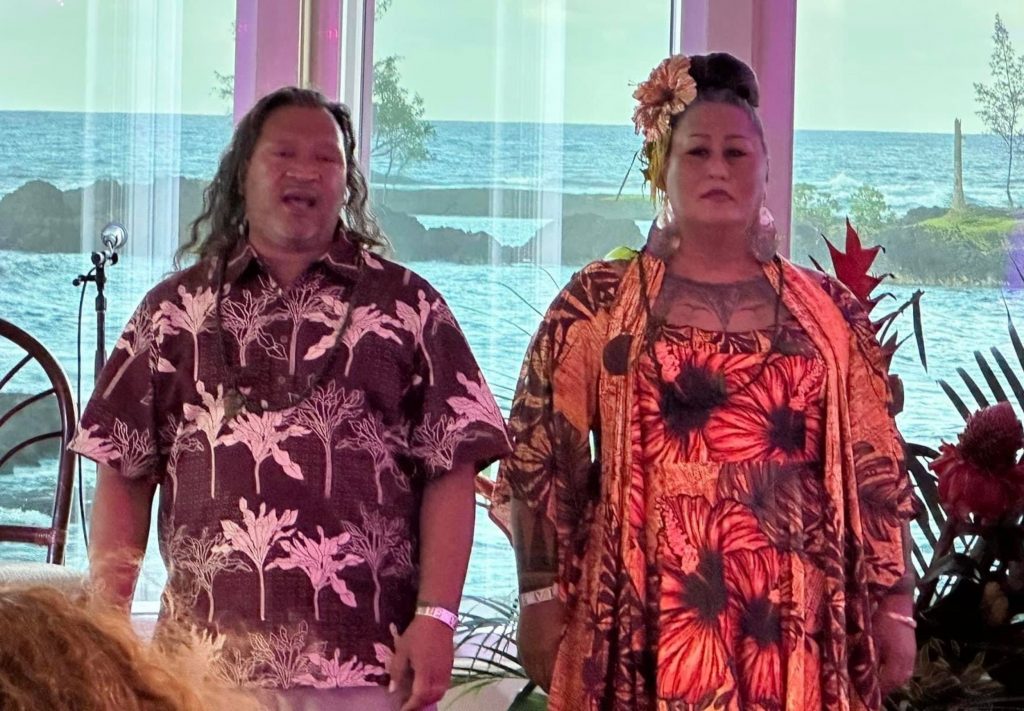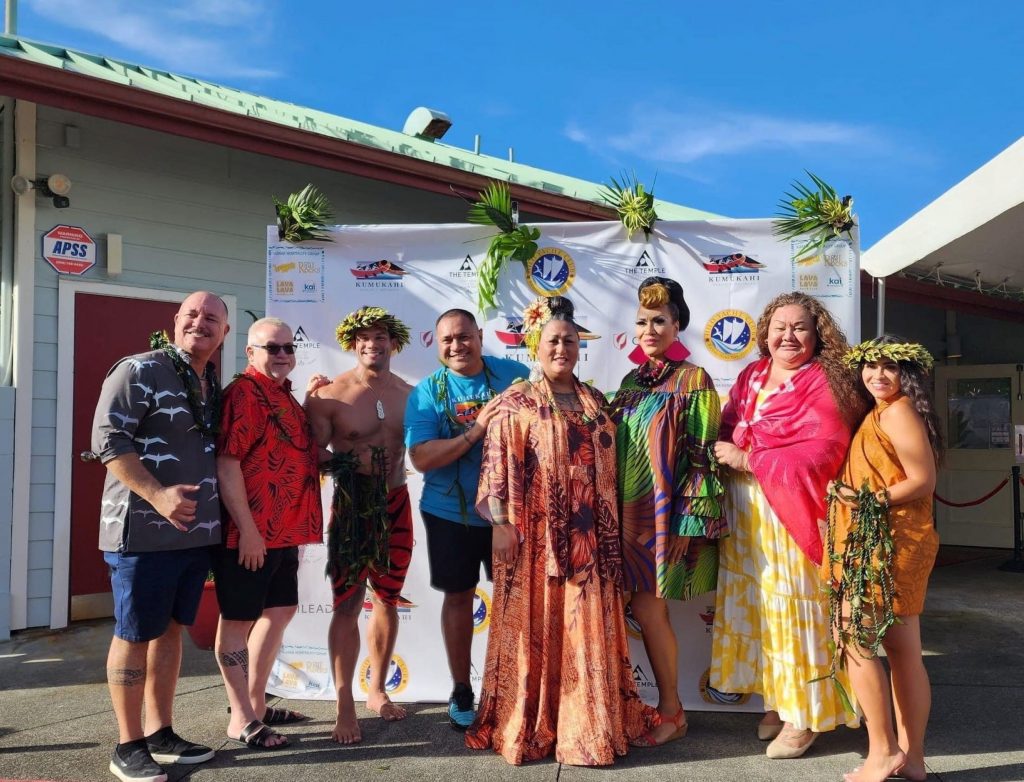Kumukahi Health part of change curve for providing LGBTQ+ health care on Big Island
Keiva Lei Cadena knew as far back as her earliest memories that she was transgender.
“I used to run around the house with a long shirt on my head to be my long hair. And in kindergarten, we played boys chased the girls and I let the boys chase me. And I knew my gender was different.”

As an adult, when the 47-year-old thinks back to facing her gender identity, she now knows that the rough times she went through could have been easier had she had access to information, support and a different type of health care at a younger age.
“I wouldn’t have experienced things like suicide attempts and possibly drug addiction and possibly homelessness and poverty,” Cadena said. “I wouldn’t have needed the validation of negative people and abuse and all of that to kind of affirm who I was. I could have done it myself, in my own body, in my own spirit.”
To help prevent others from going through what she went through, Cadena now works as the director of harm reduction services and community engagement for Kumukahi Health + Wellness on the Big Island.
The nonprofit provides a safe space, health care and other community outreach and education programs — services that can often save lives — for all underserved communities on Hawaiʻi Island. Its patients and program participants are people living with higher risks around their health care, specifically those living with HIV, people needing sexual and gender-affirming health care and others suffering from substance abuse.
Kumukahi takes a holistic approach to serving the most vulnerable people on the Big Island, many of whom are part of the LGBTQ+ community. Formerly the Hawaiʻi Island HIV/AIDS Foundation, the organization changed its name in 2021 to reflect its growth and service changes. It has offices in Hilo and Kona.
Named after Cape Kumukahi, the easternmost point of the Big Island, the nonprofit has served the Big Island in a variety of capacities since 1985. Its AIAOLA Sexual Health Clinic is the only sexual health and HIV specialty clinic on the island.
“We take the aspects of harm reduction and apply them to the services we provide in order to make what can be risky lifestyles less harmful,” Cadena said. “We really look at the social determinants of health care and try to address those with a very low threshold so folks can feel comfortable in engaging in the services we offer and not feel stigmatized or not feel discriminated against.”

She said without access to those crucial services, people in the lesbian, gay, bisexual, transgender, questioning, plus community often go looking for that validation in toxic places and can become involved in dangerous and risky behaviors.
While times have changed, and access to support services for the LGBTQ+ community have. improved, there still is not have enough of the right kind of health care and necessary support around the country and in Hawaiʻi to cope with the communityʻs issues, especially for those who are transgender or non-binary.
“Which is why organizations like Kumukahi are needed,” Cadena said. “We just keep showing up, and hopefully people are willing to open up their minds and listen and learn.”
Just seeing how others in their community are being treated in places on the mainland that adopted anti-drag queen laws, anti-transgender laws and other discriminatory measures also has a ripple effect here, further isolating LGBTQ+ people, especially those still learning about themselves and not yet confident enough to be their own advocate. That isolation can be even worse for people who live in the most rural parts of the Big Island.
“I see a lot of that within my community,” Cadena said. “A lot of people doing things on their own and not going out to seek help from organizations because they just don’t feel like they’ll be received well.”
Kumukahi provides case management for more than 280 people living with HIV and has about 75 patients receiving PrEP, or pre-exposure prophylaxis, a medication used to prevent HIV infection. The clinic also helps about 50 transgender and non-binary individuals with gender-affirming health care. It also provides sexually transmitted infection testing and treatment, hepatitis C evaluation and treatment and LGBTQ+ health care. Advanced practice registered nurse Naomi Whitaker, working alongside medical consultant Dr. Mark Knox, provides care at the clinic.
Transgender, or trans, refers to a person whose gender identity is different from the sex assigned to them at birth. People who identify as non-binary do not identify exclusively as male or female or might identify as both, somewhere in between or completely outside those categories.
Gender-affirming health care is a supportive form of care for trans and non-binary people that consists of several services including physical and mental health measures such as hormone therapy, puberty blockers, social affirmation, speaking with a mental health professional and, for adults, gender-affirming surgeries.
Kumukahi’s harm reduction efforts help hundreds of people each month through in-house and mobile services including syringe exchange, free condoms, sexually transmitted infection screening and referrals, free HIV and hepatitis C testing, sexual health education and distribution of Nalaxone, a medicine that rapidly reverses opioid overdose. The nonprofit even provides a food bank for its HIV patients.
The demand is high for Kumukahi’s services. Cadena said there is a waitlist for people seeking access to PrEP from the clinic and another list of people waiting to receive gender-affirming care. However, with only one health care provider, it’s impossible right now to help everyone who needs and wants to access the clinic’s services.
Cadena moved from Oʻahu to the Big Island three years ago to work for Kumukahi. She has seen firsthand the difference in access to LGBTQ+ health care between both islands, which is something that has always bothered her as a trans woman and a person living with HIV: “Medical care is such a difficult thing to access here.”
She said there is a lack of providers in general around the Big Island when it comes to LGBTQ+ health care. She said Kumukahi gets calls almost everyday from people hoping to get a hormone doctor or need other gender-affirming care.
“We see that across this island all the time,” Cadena said. “That there’s not enough providers that are culturally sensitive; that are updated and aware and knowledgeable about HIV care and about HIV prevention; that know how to do gender-affirming care, including hormone therapies; or that are interested in providing that kind of care to our really vulnerable community.”
When providers who check all the right boxes are available, oftentimes they are only on the island for a short time, sometimes just a couple of years, before they move on. That makes it challenging to find high-quality, ongoing, long-term care for people who need that kind of specialty health care here. It is more available on Oʻahu, but that means patients would need to fly there, which often isn’t covered by their insurance.
Fortunately, larger health care and social service organizations have taken note and are reaching out to Kumukahi for help. Cadena said they don’t want to offend members of the LGBTQ+ community and are asking how to properly address them. They also are asking Kumukahi’s staff how to better serve LGBTQ+ people.
“That’s always encouraging because I know that we’re part of it, that change curve,” she said. “And that’s a great thing.”
The nonprofit during the first week of June, which is Pride Month, also collaborated with one major Big Island medical provider, at its request, to facilitate a focus group of LGBTQ+ people between the ages of 19 and the early 70s to discuss health care. Cadena is putting together the report, which will help guide the provider with modernizing and developing policies specifically tailored to that community and being more culturally sensitive.
Cadena said a future where everyone’s health care needs are taken care of — no matter who they are — starts with understanding the difference between equality and equity.
“If we just give everybody everything that they need equally, there’s still gonna be people that fall behind and that need a little bit more. That’s where that equity comes in,” she said. “When we’re creating services and programs, and dare I say funding, that is really equitable to serve the people that are most underserved, I think that’s when we can really start change.”
As a person who has been HIV positive/undetectable for more than 10 years, Tim Byars, a client of Kumukahi’s medical case management services, has had many doctors and organizations help maintain his health.
“The difference at [Kumukahi Health + Wellness] is the instant judgement-free relief, and their ability to meet me where I am at in any stage of self care,” Byars said. “With their many programs, I feel safe, genuinely cared for and part of the family. I know can trust them with my testing, medication and insurance navigation and harm reduction resources.“
Kumukahi will continue to look for ways to collaborate and work together with others to serve those vulnerable populations. Cadena said working together and networking to provide services helps all of those involved meet their goals.
“We don’t see enough of that collaboration to create a healthy community,” Cadena said, adding everybody wants to be the hero but it will take everyone to make change happen. “Let’s all be heroes together. Let’s work together and do this.”
To learn more about Kumukahi Health + Wellness, its services or how you can help, click here and follow the organization on Facebook, Instagram and YouTube.























